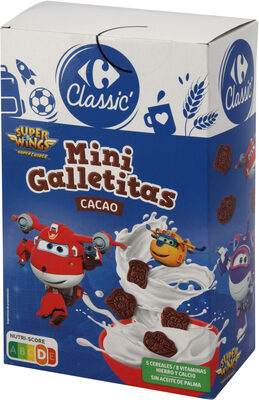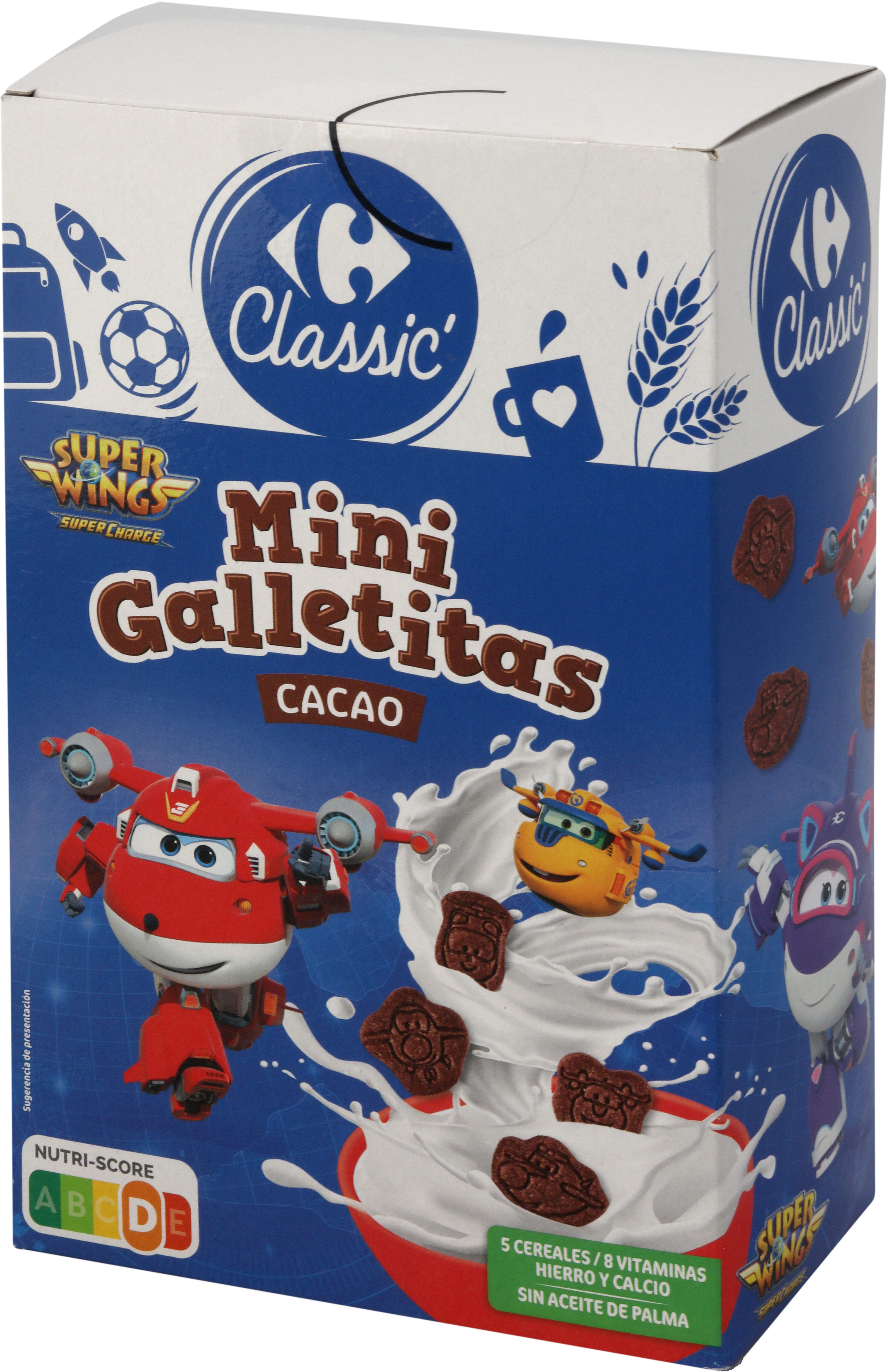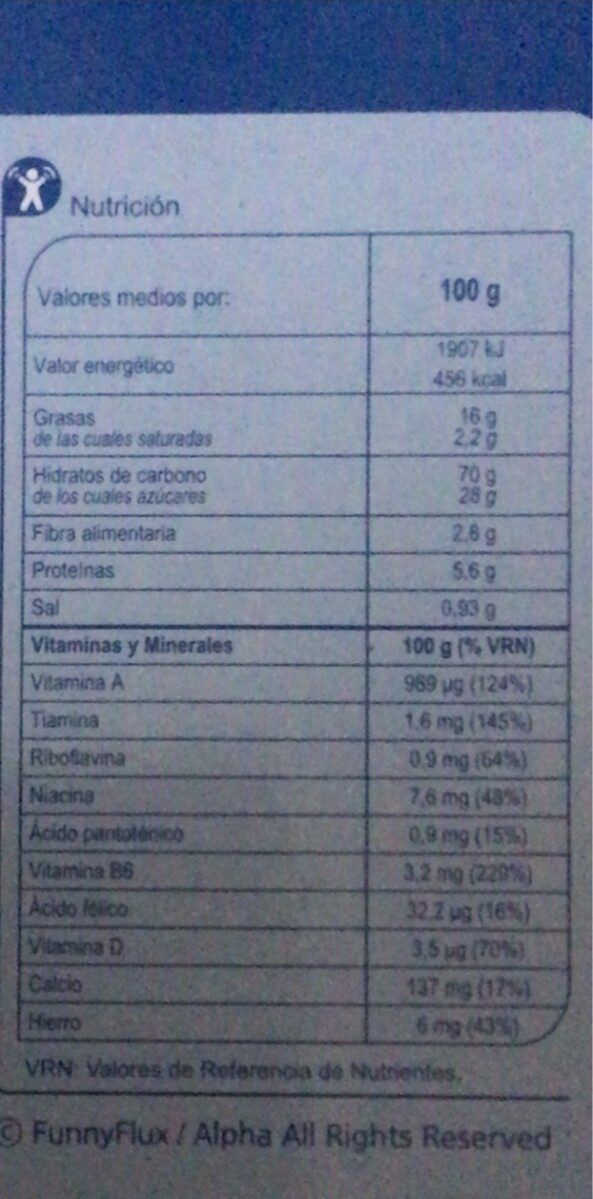Help us make food transparency the norm!
As a non-profit organization, we depend on your donations to continue informing consumers around the world about what they eat.
The food revolution starts with you!
Minigalletitas cacao - Carrefour
Minigalletitas cacao - Carrefour
This product page is not complete. You can help to complete it by editing it and adding more data from the photos we have, or by taking more photos using the app for Android or iPhone/iPad. Thank you!
×
Some of the data for this product has been provided directly by the manufacturer Carrefour España.
Barcode: 8431876293746 (EAN / EAN-13)
Brands: Carrefour
Categories: Snacks, Sweet snacks, Biscuits and cakes, Biscuits, Chocolate biscuits, es:Galletas de desayuno
Labels, certifications, awards: Organic, No palm oil, Nutriscore, Nutriscore Grade D
Stores: Carrefour
Countries where sold: Spain
Matching with your preferences
Health
Ingredients
-
35 ingredients
: Harina 58,3% (trigo (42,3%), arroz (5,7%), centeno (4,7%), cebada (3,8%), avena (0,9%), salvado de trigo (0,9%)), azúcar, aceite vegetal girasol alto oleico, maltodextrina, cacao desgrasado en polvo (2,2%), suero de leche en polvo, jarabe de glucosa fructosa, miel de flores, sales de calcio y hierro, chocolate (leche, soja), gasificantes (carbonato ácido de amonio, carbonato ácido de sodio), aromas, vitaminas (Vitamina A, Tiamina, Riboflavina, Niacina, Ácido pantoténico, Vitamina B6, Ácido fólico, Vitamina D), y emulgente (lecitinas (girasol)).Allergens: Gluten, Milk, SoybeansTraces: Nuts, Sulphur dioxide and sulphites
Food processing
-
Ultra processed foods
Elements that indicate the product is in the 4 - Ultra processed food and drink products group:
- Additive: E322 - Lecithins
- Ingredient: Emulsifier
- Ingredient: Flavouring
- Ingredient: Glucose
- Ingredient: Maltodextrin
- Ingredient: Whey
Food products are classified into 4 groups according to their degree of processing:
- Unprocessed or minimally processed foods
- Processed culinary ingredients
- Processed foods
- Ultra processed foods
The determination of the group is based on the category of the product and on the ingredients it contains.
Additives
-
E322 - Lecithins
Lecithins are natural compounds commonly used in the food industry as emulsifiers and stabilizers.
Extracted from sources like soybeans and eggs, lecithins consist of phospholipids that enhance the mixing of oil and water, ensuring smooth textures in various products like chocolates, dressings, and baked goods.
They do not present any known health risks.
-
E500 - Sodium carbonates
Sodium carbonates (E500) are compounds commonly used in food preparation as leavening agents, helping baked goods rise by releasing carbon dioxide when they interact with acids.
Often found in baking soda, they regulate the pH of food, preventing it from becoming too acidic or too alkaline. In the culinary world, sodium carbonates can also enhance the texture and structure of foods, such as noodles, by modifying the gluten network.
Generally recognized as safe, sodium carbonates are non-toxic when consumed in typical amounts found in food.
-
E500ii - Sodium hydrogen carbonate
Sodium hydrogen carbonate, also known as E500ii, is a food additive commonly used as a leavening agent.
When added to recipes, it releases carbon dioxide gas upon exposure to heat or acids, causing dough to rise and resulting in a light, fluffy texture in baked goods.
It is generally recognized as safe (GRAS) by regulatory authorities when used in appropriate quantities and poses no significant health risks when consumed in typical food applications.
-
E503 - Ammonium carbonates
Ammonium carbonate: Ammonium carbonate is a salt with the chemical formula -NH4-2CO3. Since it readily degrades to gaseous ammonia and carbon dioxide upon heating, it is used as a leavening agent and also as smelling salt. It is also known as baker's ammonia and was a predecessor to the more modern leavening agents baking soda and baking powder. It is a component of what was formerly known as sal volatile and salt of hartshorn.Source: Wikipedia
-
E503ii - Ammonium hydrogen carbonate
Ammonium carbonate: Ammonium carbonate is a salt with the chemical formula -NH4-2CO3. Since it readily degrades to gaseous ammonia and carbon dioxide upon heating, it is used as a leavening agent and also as smelling salt. It is also known as baker's ammonia and was a predecessor to the more modern leavening agents baking soda and baking powder. It is a component of what was formerly known as sal volatile and salt of hartshorn.Source: Wikipedia
Ingredients analysis
-
Palm oil free
No ingredients containing palm oil detected
-
Non-vegan
Non-vegan ingredients: Whey powder, Flower honey, Milk
-
Vegetarian status unknown
Unrecognized ingredients: Calcium salts, Iron, Thiamin, Folic acid, Vitamin D
-
Details of the analysis of the ingredients
: Harina 58.3% (trigo 42.3%, arroz 5.7%, centeno 4.7%, cebada 3.8%, avena 0.9%, salvado de trigo 0.9%), azúcar, aceite vegetal girasol alto oleico, maltodextrina, cacao desgrasado en polvo 2.2%, suero de leche en polvo, jarabe de glucosa fructosa, miel de flores, sales de calcio, hierro, chocolate (leche, soja), gasificantes (carbonato ácido de amonio, carbonato ácido de sodio), aromas, vitaminas, Vitamina A, Tiamina, Riboflavina, Niacina, Ácido pantoténico, Vitamina B6, Ácido fólico, Vitamina D, y emulgente (lecitinas (girasol))- Harina -> en:flour - vegan: yes - vegetarian: yes - ciqual_proxy_food_code: 9410 - percent: 58.3
- trigo -> en:wheat - vegan: yes - vegetarian: yes - ciqual_proxy_food_code: 9410 - percent: 42.3
- arroz -> en:rice - vegan: yes - vegetarian: yes - ciqual_proxy_food_code: 9100 - percent: 5.7
- centeno -> en:rye - vegan: yes - vegetarian: yes - ciqual_food_code: 9390 - percent: 4.7
- cebada -> en:barley - vegan: yes - vegetarian: yes - percent: 3.8
- avena -> en:oat - vegan: yes - vegetarian: yes - ciqual_food_code: 9310 - percent: 0.9
- salvado de trigo -> en:wheat-bran - vegan: yes - vegetarian: yes - ciqual_food_code: 9621 - percent: 0.9
- azúcar -> en:sugar - vegan: yes - vegetarian: yes - ciqual_proxy_food_code: 31016
- aceite vegetal girasol alto oleico -> en:high-oleic-sunflower-oil - vegan: yes - vegetarian: yes - from_palm_oil: no - ciqual_food_code: 17440
- maltodextrina -> en:maltodextrin - vegan: yes - vegetarian: yes
- cacao desgrasado en polvo -> en:fat-reduced-cocoa-powder - vegan: yes - vegetarian: yes - ciqual_food_code: 18100 - percent: 2.2
- suero de leche en polvo -> en:whey-powder - vegan: no - vegetarian: maybe
- jarabe de glucosa fructosa -> en:glucose-fructose-syrup - vegan: yes - vegetarian: yes - ciqual_food_code: 31077
- miel de flores -> en:flower-honey - vegan: no - vegetarian: yes - ciqual_food_code: 31008
- sales de calcio -> en:calcium-salts
- hierro -> en:iron
- chocolate -> en:chocolate - vegan: maybe - vegetarian: yes
- leche -> en:milk - vegan: no - vegetarian: yes - ciqual_proxy_food_code: 19051
- soja -> en:soya - vegan: yes - vegetarian: yes
- gasificantes -> en:raising-agent
- carbonato ácido de amonio -> en:e503ii - vegan: yes - vegetarian: yes
- carbonato ácido de sodio -> en:e500ii - vegan: yes - vegetarian: yes
- aromas -> en:flavouring - vegan: maybe - vegetarian: maybe
- vitaminas -> en:vitamins - vegan: yes - vegetarian: yes
- Vitamina A -> en:vitamin-a - vegan: yes - vegetarian: yes
- Tiamina -> en:thiamin
- Riboflavina -> en:e101 - vegan: maybe - vegetarian: yes
- Niacina -> en:e375 - vegan: maybe - vegetarian: maybe
- Ácido pantoténico -> en:pantothenic-acid - vegan: yes - vegetarian: yes
- Vitamina B6 -> en:vitamin-b6 - vegan: yes - vegetarian: yes
- Ácido fólico -> en:folic-acid
- Vitamina D -> en:vitamin-d
- y emulgente -> en:emulsifier
- lecitinas -> en:e322 - vegan: maybe - vegetarian: maybe
- girasol -> en:sunflower - vegan: yes - vegetarian: yes
- lecitinas -> en:e322 - vegan: maybe - vegetarian: maybe
- Harina -> en:flour - vegan: yes - vegetarian: yes - ciqual_proxy_food_code: 9410 - percent: 58.3
Nutrition
-
Poor nutritional quality
This product is not considered a beverage for the calculation of the Nutri-Score.
Positive points: 2
- Proteins: 3 / 5 (value: 5.7, rounded value: 5.7)
- Fiber: 2 / 5 (value: 2.8, rounded value: 2.8)
- Fruits, vegetables, nuts, and colza/walnut/olive oils: 0 / 5 (value: 0, rounded value: 0)
Negative points: 15
- Energy: 5 / 10 (value: 1890, rounded value: 1890)
- Sugars: 4 / 10 (value: 21, rounded value: 21)
- Saturated fat: 2 / 10 (value: 2.2, rounded value: 2.2)
- Sodium: 4 / 10 (value: 368, rounded value: 368)
The points for proteins are not counted because the negative points are greater or equal to 11.
Nutritional score: (15 - 2)
Nutri-Score:
-
Nutrient levels
-
Fat in moderate quantity (16%)
What you need to know- A high consumption of fat, especially saturated fats, can raise cholesterol, which increases the risk of heart diseases.
Recommendation: Limit the consumption of fat and saturated fat- Choose products with lower fat and saturated fat content.
-
Saturated fat in moderate quantity (2.2%)
What you need to know- A high consumption of fat, especially saturated fats, can raise cholesterol, which increases the risk of heart diseases.
Recommendation: Limit the consumption of fat and saturated fat- Choose products with lower fat and saturated fat content.
-
Sugars in high quantity (21%)
What you need to know- A high consumption of sugar can cause weight gain and tooth decay. It also augments the risk of type 2 diabetes and cardio-vascular diseases.
Recommendation: Limit the consumption of sugar and sugary drinks- Sugary drinks (such as sodas, fruit beverages, and fruit juices and nectars) should be limited as much as possible (no more than 1 glass a day).
- Choose products with lower sugar content and reduce the consumption of products with added sugars.
-
Salt in moderate quantity (0.92%)
What you need to know- A high consumption of salt (or sodium) can cause raised blood pressure, which can increase the risk of heart disease and stroke.
- Many people who have high blood pressure do not know it, as there are often no symptoms.
- Most people consume too much salt (on average 9 to 12 grams per day), around twice the recommended maximum level of intake.
Recommendation: Limit the consumption of salt and salted food- Reduce the quantity of salt used when cooking, and don't salt again at the table.
- Limit the consumption of salty snacks and choose products with lower salt content.
-
-
Nutrition facts
Nutrition facts As sold
for 100 g / 100 mlCompared to: es:galletas-de-desayuno Energy 1,890 kj
(452 kcal)-7% Fat 16 g -25% Saturated fat 2.2 g -73% Carbohydrates 70 g +11% Sugars 21 g -27% Fiber 2.8 g -14% Proteins 5.7 g -10% Salt 0.92 g +27% Fruits‚ vegetables‚ nuts and rapeseed‚ walnut and olive oils 0 % -100% Fruits‚ vegetables‚ nuts and rapeseed‚ walnut and olive oils (estimate from ingredients list analysis) 0 %
Environment
-
Eco-Score D - High environmental impact
⚠ ️Select a country in order to include the full impact of transportation.The Eco-Score is an experimental score that summarizes the environmental impacts of food products.→ The Eco-Score was initially developped for France and it is being extended to other European countries. The Eco-Score formula is subject to change as it is regularly improved to make it more precise and better suited to each country.Life cycle analysis
-
Average impact of products of the same category: C (Score: 56/100)
Category: Biscuit (cookie), with chocolate, prepacked
Category: Biscuit (cookie), with chocolate, prepacked
- PEF environmental score: 0.47 (the lower the score, the lower the impact)
- including impact on climate change: 5.92 kg CO2 eq/kg of product
Stage Impact Agriculture
63.6 %Processing
29.8 %Packaging
2.3 %Transportation
3.2 %Distribution
1.0 %Consumption
0.0 %
Bonuses and maluses
-
Missing origins of ingredients information
Malus: -5
⚠ ️ The origins of the ingredients of this product are not indicated.
If they are indicated on the packaging, you can modify the product sheet and add them.
If you are the manufacturer of this product, you can send us the information with our free platform for producers.
-
Missing packaging information for this product
Malus: -15
⚠ ️ The information about the packaging of this product is not filled in.⚠ ️ For a more precise calculation of the Eco-Score, you can modify the product page and add them.
If you are the manufacturer of this product, you can send us the information with our free platform for producers.
Eco-Score for this product
-
Impact for this product: D (Score: 36/100)
Product: Minigalletitas cacao - Carrefour
Life cycle analysis score: 56
Sum of bonuses and maluses: -20
Final score: 36/100
-
Carbon footprint
-
Equal to driving 3.1 km in a petrol car
592 g CO² per 100g of product
The carbon emission figure comes from ADEME's Agribalyse database, for the category: Biscuit (cookie), with chocolate, prepacked (Source: ADEME Agribalyse Database)
Stage Impact Agriculture
52.9 %Processing
42.0 %Packaging
1.9 %Transportation
2.9 %Distribution
0.3 %Consumption
0.0 %
Packaging
-
Missing packaging information for this product
⚠ ️ The information about the packaging of this product is not filled in.Take a photo of the recycling information Take a photo of the recycling information
Transportation
-
Origins of ingredients
Missing origins of ingredients information
⚠ ️ The origins of the ingredients of this product are not indicated.
If they are indicated on the packaging, you can modify the product sheet and add them.
If you are the manufacturer of this product, you can send us the information with our free platform for producers.Add the origins of ingredients for this product Add the origins of ingredients for this product
Report a problem
-
Incomplete or incorrect information?
Category, labels, ingredients, allergens, nutritional information, photos etc.
If the information does not match the information on the packaging, please complete or correct it. Open Food Facts is a collaborative database, and every contribution is useful for all.
Data sources
Product added on by kiliweb
Last edit of product page on by org-carrefour-espana.
Product page also edited by ecoscore-impact-estimator, openfoodfacts-contributors, paularm, roboto-app, teolemon, thaialagata, yuka.sY2b0xO6T85zoF3NwEKvlm9pQ-XbmQ7ZbQPjhhSF3u2iNJXCb_t0xI3CFqs.








